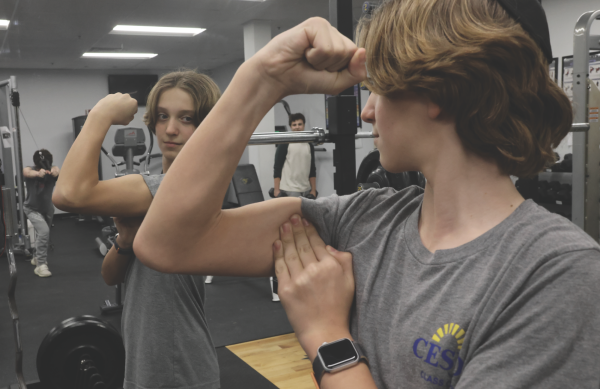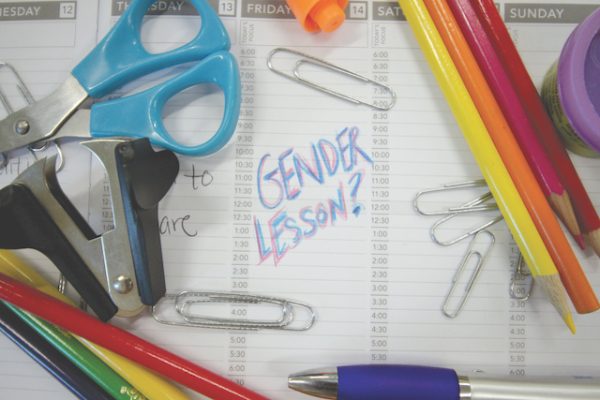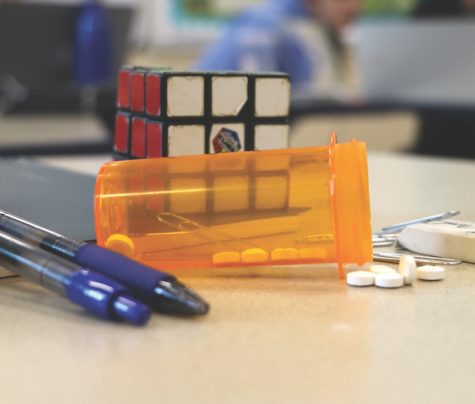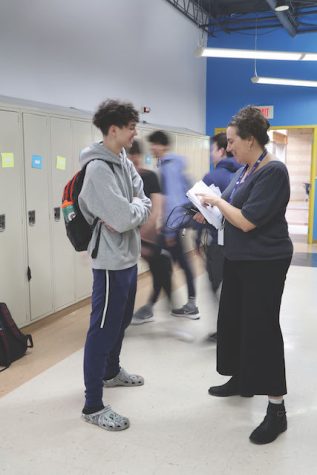The friendship puzzle
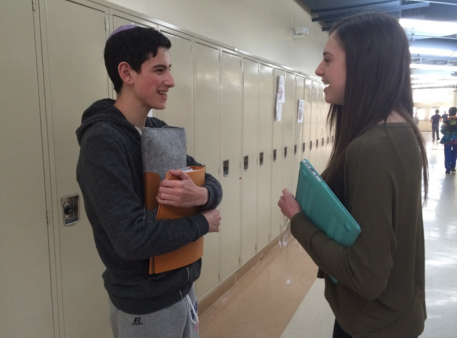
Freshmen Henry Sosland and Shira Finke discuss their recent English class.
February 18, 2016
Through the many years of sleepovers, parties, field trips and FaceTime calls, you were positive the friends you made in school would last a lifetime. But when you decline yet another event because you’re too busy studying for a test, you’re not so sure anymore.
According to Guidance Counselors Melissa Gartner and Rachel Soifer, striking a balance between schoolwork and friendships can be tricky for CESJDS students.
“The truth is that there are times when one must make a tough choice and sacrifice one over the other,” Soifer said.
Often forgoing the chance to socialize, many students make schoolwork a priority even on the weekends. For junior Sophia Godin, however, weekdays are devoted to homework while Friday and Saturday nights are considered “friend times.”
“I think [on weekdays] you definitely have the temptation that you want to hang out with friends, but unfortunately, it’s not that realistic if you want to do well in school,” Godin said. “It’s hard to make that choice that you can’t hang out with friends because you really want to, but it’s sort of necessary at JDS, and once you get older.”
For students who live farther away from school, it can be even harder to socialize when the trek to a friend’s house itself is too time-consuming. Living in Washington, D.C., sophomore Ayelette Halbfinger struggles to both complete her schoolwork and take the time to visit friends who live at least 30 minutes away.
“Especially when I was at Hebrew Academy, all of my friends lived really close together, and I would go over and see them over the weekend,” Halbfinger said. “Obviously while I was with them I would do work … but there were definitely times when I ended up staying up later and not getting as much sleep because I had spent the day out with friends instead of doing work.”
Likewise, students can find it more difficult to maintain relationships with friends who do not go to JDS or are not in their classes, since conversations with friends during the week tend to revolve around school.
“In a lot of my friendships, I call them, we talk about homework for a couple of hours and in between we’ll have other chats, but I can’t do that with the people who don’t go to JDS,” Godin said. “I have to make a conscious effort to put down my homework and take a break, and I think that’s a lot harder for me to do.”
While school work can be harmful for some relationships, it can also serve as a shared burden that draws students together. Math teacher Andrew Goldman often sees students working together in his classes who he does not normally see walking together in the hallways. Godin has experienced this firsthand.
“I’ve made friends with people who I’m in classes with just by studying with them or talking about the subject matter,” Godin said.
Goldman believes that friends can often serve as an “extra resource” for students when they study for tests, or as help for students to gain another perspective to solve a problem. While freshman Henry Sosland works with friends to memorize information for classes, he prefers working alone on more difficult assignments as socializing can sometimes get in the way of his school work.
“[Working together] ended up not being that good, because I kept getting distracted a lot more easily,” Sosland said.
Even if students do not study together, according to Gartner and Soifer, friendships can and should be maintained despite a heavy focus on schoolwork. Students can accomplish this by consciously prioritizing their commitments and openly communicating with their friends.
“Relationship and friendship formation is an important part of growing up and learning about yourself and your values,” Gartner said.
Halbfinger recognized that although sometimes it may be difficult to maintain friendships, like when she has had to miss social events or spending time with friends because of schoolwork, friendships should still be a top priority for students.
“Friends can definitely enhance your attitude towards school and performance in school,” Halbfinger said. “You need to know how much is too much and what amount of involvement of hanging out with friends is good in order to find that right balance. And obviously that takes work, but the more attention you pay really does pay off.”









